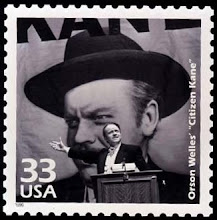Happy Birthday to Paul Verhoeven, who turns 71 today. Though most famous for his wry, self-aware
science fiction films (RoboCop, Starship Troopers) or his overwrought “erotic”
dramas (Basic Instinct, Showgirls), his most recent,
the WWII thriller Black Book (2006) made in his homeland the Netherlands, is my favorite of his—and
not just because stamps play a prominent part.
The film follows Rachel Steinn, a Jew who is trying to
survive the Nazi occupation of Holland in 1944.
Along the way, she faces tragedy, danger, and a series of harrowing,
unexpected, but quite plausible turns of events. It is a movie with a great sense of history,
without fetishizing the period trappings.
It has some terrific plot twists and character reversals without ever
feeling gratuitous. And it is very
astute in showing the gray areas of morality when people are forced into
unthinkable situations. To say any more
would be to give too much away, and I’ll try to discuss the stamps while still
remaining as spoiler-free as possible.
Early on, she is recruited by the Dutch Resistance to
get close to a Nazi officer named Muntze, so she contrives an encounter on a
train on which he’ll be riding.
He’s enjoying a book when she decides to break the ice.
“Exciting?”“Very exciting. At least to me.” (He shows her the book, a stamp collection album)
”Stamps. I was crazy about them as a kid. All those faraway countries. ”“I started collecting them when I was six. Maybe that’s why I studied geography.”“May I have a look? I promise to be careful. Polski…France…”
“I collect the stamps of the countries I’m stationed in. First Poland, then France, and now here.”“It stops in the middle of our queen.”“The Wilhelmina stamps from the Dutch East Indies. I’m not sure I’ll ever get my hands on those.”
From our first introduction to Muntze, we get a sense of his
character through the stamps. He’s
clearly not a casual collector, carrying his album around with him. Philately was a far more common hobby back
then, to be sure, but it still evokes a certain type of fussy elitism. This is only compounded by the fact that he’s
so blasé about how he associates his military conquests with opportunities
to expand his collection. Countries,
resources, assets are all just commodities to be collected and displayed, like his
stamps. It’s a cold-blooded way to view his
job and his pastime.
Later, she notices that a friend of hers has those stamps on
an envelope in his safe, so she procures them in hopes of using them as a ploy
to approach Muntze at Nazi headquarters.
“My relatives in the Dutch East Indies used to write to us a lot. My mother kept the letters, so I took all these off for you. With steam.”
“Unbelievable. Beautiful. Very beautiful.”
We then see that as his secretary opens the window, he
protects the stamps from a slight draft (“We mustn’t damage the stamps”). Again, a fastidiousness that borders on being
a little precious, if not perverse.
“What will you do with the stamps?”“Nothing, really. They were tucked away in a drawer.”“It’s all the Wilhelmina stamps I don’t have.”
“If you see anything you like, you can take it.”“Thank you. I appreciate that.”
And so now she has her access, insinuating herself into his
life and eventually his employ. A
“cover” is a stamp-collecting term, and she has her own cover now, too.
-->
While engaging in espionage as a
secretary in the same building, she also continues an ongoing flirtation campaign
with him that culminates in the following foreplay exchange after an office
party:“I’d love to see your stamp collection.”“But it’s enormous.”“I’m not in any rush.”
Needless to say, this is any philatelist’s wildest dream
come true (especially since, as any stamp convention will substantiate, stamp
collectors are overwhelmingly male).
But, as we learn over and over in this film, not everything is as it
seems, since Muntze reveals he knows her secret in what can only be described as
some incredibly awkward pillow talk (at gunpoint):
“Do you think I’m stupid? Suddenly, I meet this beautiful woman. A few days later she shows up with the stamps I’ve been looking for. Then that same woman turns out to be Jewish. Right after she starts working for us, Franken’s top agent gets shot. A lot of coincidence, don’t you think?”
So alas, any notion that a postage stamp hobby might be your
“in” with the ladies is confirmed as the height of outlandishness that
should leave any collector incredulous.
I won’t give away how things develop from there in the film, but it’s a remarkable
roller coaster ride filled with further betrayal and bravery. By all means, check it out.
As for the Wilhelmina stamps? Well, upon closer inspection, we learn that
the stamps she brings are not the stamps he needs. Here’s the blank page from his book—the 1923
Jubileum stamps from the Dutch Indies:
And here’s what they look like (pulled from the internet):
But the stamps she brings and the stamp he examines don’t
look anything like them. In fact, we see
that he does have a Wilhelmina page that’s already complete, and most of the
stamps she brings appear to be part of that series:
However, we do get a quick glimpse of the envelope she used
to obtain the stamps and a few of these Dutch Indies stamps are seen there, so
maybe they’re at the bottom of the tin she brings to him, under the superfluous ones.
It should be noted that all these stamps were
discontinued once the Nazis took over, replaced by Third Reich stamps, so it’s
not surprising that Muntze would have a hard time finding some of them,
because they would’ve been completely out of circulation by the time he arrives in Holland.











No comments:
Post a Comment